by Heidi Kyser
For its second televised roundtable discussion of questions on the Nevada ballot this November, Vegas PBS focused on No. 1, pertaining to background checks for gun purchses:
Shall Chapter 202 of the Nevada Revised Statues be amended to prohibit, except in certain circumstances, a person from selling or transferring a firearm to another person unless a federally-licensed dealer first conducts a federal background check on the potential buyer or transferee?
Just before the cameras started rolling, moderator Mitch Fox noticed participants scanning their notes for data. “I hope this isn’t all canned,” he quipped.
He had no cause to worry, it turns out. Opponents and proponents of the so-called background check initiative sparred passionately, sometimes talking over each other and occasionally even using the polite version of liar, liar, pants on fire: “That’s simply not true, and so-and-so knows it.” But they definitely came armed with talking points — and plenty of numbers — to help make their cases.
When Fox notes that 75 percent of guns used to commit crimes are procured illegally, Ryan Hamilton of NRA-Nevadans for Freedom says it’s actually closer to 80 percent, according to more recent research. Even if it is 75 percent, Clark County District Attorney Steve Wolfson wonders, “What about the other 25 percent? Shouldn’t we stop them if we can?” Nevadans for Background Checks’ Jennifer Crowe adds, “States that have passed similar laws have seen 46 percent fewer homicides of women by their domestic partners.”
 It’s a whole lot of numbers for a 30-minute segment. But viewers who have trouble parsing them on the fly will also get stories, both real and hypothetical, to latch onto — mostly related to the central debate about whether the law would actually stop criminals from getting guns, as the pro side argues, or just prevent law-abiding citizens from lending them to each other, as the con side believes.
It’s a whole lot of numbers for a 30-minute segment. But viewers who have trouble parsing them on the fly will also get stories, both real and hypothetical, to latch onto — mostly related to the central debate about whether the law would actually stop criminals from getting guns, as the pro side argues, or just prevent law-abiding citizens from lending them to each other, as the con side believes.
City councilman Stavros Anthony gives this for-instance: A neighbor, who’s aware of his near-three-decades-long service in law enforcement, feels unsafe because she’s being stalked by an ex. She comes over to ask Anthony to borrow his gun. He doesn’t give it to her, because it would be too cumbersome to go down to a gun store and have them run a background check on her, as the new law would require. The unarmed neighbor is then killed by the ex. “This is an attack on the second amendment,” he concludes.
Wolfson doesn’t back down. What if that neighbor, unbeknownst to you, has been convicted of a felony and isn’t supposed to have a gun, he hypothesizes. You innocently transfer the gun, which is then used to kill the ex. “Right now, a background check takes 5-10 days,” he says. “Under this (new) law, you can get it in just a few minutes. You’re safe, secure, knowing that the person you’re transferring the weapon to should have one under the law.”
Crowe drives the point home with an actual example from the past year of a local man who killed his wife and shot his two children with a gun he bought through a private sale in order to circumvent the law. “A background check would have blocked him from buying that gun,” she says.
Hamilton was visibly frustrated by this story during taping, but didn’t have much time to reply, so Desert Companion asked him after the roundtable what he was dying to say.
“If you’re a prohibited person who’s trying to acquire a firearm, that’s already a felony,” he says. “We don’t need the new crime. To erect a gross misdemeanor and be like, ‘Ah ha! He’s going to stop now!’ is total insanity. … This law targets the behavior of innocent people.”
Crowe, speaking with Desert Companion, disagreed. In the case cited, she says, the police report makes clear that the person who sold the perpetrator the gun understood and wanted to follow the law.
“Would (the perpertrator) have gotten the gun another way? Maybe,” she says. “But the law would have made it harder, and that’s the point. It’s easy to say criminals aren’t going to go through background checks, but when you stop people at the gun store and then you stop them online, it’s only the hardest of hard criminals who are going to know where to get one after that.”
Editor’s note: The full roundtable airs at 7:30 this evening on local PBS stations and will be available for later viewing at vegaspbs.org.
For Full Article Click Here
